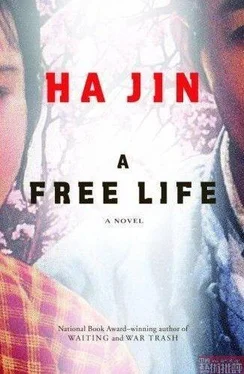From that day on, Nan would bring in the feeder every night and hang it out in the morning. A tube of seeds would last three or four days now, and a lot of birds gathered on the deck and around the feeder in the daytime. Even when it rained, some of them would stay around. Nan was not pleased that they had grown lazy and plump and taken the deck as a habitat of sorts, but he still fed them.
When he mowed the lawn in the backyard he noticed that there seemed to be more and more insects jumping out and darting away, and there were also more toads, frogs, and lizards in the grass. Then one day he was frightened to see a green snake, about three feet long, slithering away to the lakeside while the lawn mower was snarling and flinging bits of grass aside. He wasn't sure if it was poisonous, but he was positive it had come into the yard to hunt for toads and lizards. The thought came to him that lizards, frogs, and toads must have gathered here because insects were teeming in the yard. The insect proliferation must have been due to the fact that the birds he fed had quit searching for food in nature and let insects multiply in the grass. As a result, more frogs and lizards frequented here, and they in turn attracted snakes.
This realization made Nan stop feeding the birds. He didn't want snakes to lurk and crawl in the backyard, even if most of them were nonpoisonous. The birds would have to catch insects from now on. As the number of toads and lizards decreased in the grass, fewer snakes came around, although sometimes Nan saw them zigzagging in the lake, their tiny heads raised above the water. They probably lived among the rocks under the short bridge in the east.
In the winter the birds had to be starving, so Nan resumed feeding them. To his dismay, not many of them showed up now; still, he kept the feeder full every day and took it back in at night.
ONE MORNING Mrs. Wang called and begged Nan to come to her house immediately. Her husband had suffered a heart attack and had to be rushed to Gwinnett Hospital. She asked Nan to accompany her there because she wouldn't be able to understand some of the medical terms the doctors and nurses used. Nan set out after telling Pingping that if she and Niyan couldn't handle the business by themselves, they should close up for a few hours until he came back. As he was approaching the Wangs', an ambulance pulled into their driveway and two paramedics hopped out. Nan hastened his pace and caught up with the men. Mrs. Wang let the three of them in. Her husband was lying in bed, his eyes closed and his papery hand resting on his abdomen. But he was aware of the people around him and nodded as his wife told him that they were taking him to the hospital. Somehow Mr. Wang had lost his English and murmured Chinese in response to the paramedic who spoke to him while carrying him out.
In the ambulance Nan sat next to Mr. Wang, whose face was colorless and shriveled. The old man kept saying to his wife, "I'm bone tired." His lips were bluish and his white hair wet and mussed up.
Finally his wife gave way to her emotion, begging him not to leave her so suddenly. He opened his puffy eyes and murmured, "I want to go back."
" Where do you want to go?"
"Home."
"We'llgo home soon."
His mouth stirred as he tried to smile, obviously tormented by angina. He began gasping for breath again, a gurgling sound in his throat. One of the paramedics, a stocky fellow, put an oxygen mask on his face, which eased the patient's breathing within a minute. Nan wasn't sure whether by "home" the old man was referring to their house here or to Taiwan or Fujian, his native province on the mainland.
Mr. Wang was rushed into a trauma room in the ER. His wife and Nan waited outside, sitting on orange chairs. Nan told Mrs. Wang to take a nap, since she might have to stay here a whole day and should rest some now. Soon she dozed off in spite of all the activity in the lounge. Meanwhile, Nan paced the floor and regretted not having brought along a book. He inserted two nickels into a pay phone and called the Gold Wok to check on Pingping and tell her about Mr. Wang's condition, which seemed critical. His wife couldn't talk with him for long because she and Niyan were overwhelmed with work there.
About half an hour later, a young doctor with tired eyes and curly sideburns stepped out of the trauma room and said to Mrs. Wang, "He isn't doing too well."
"Please save him!" she begged.
"We're doing our best." The doctor handed his half-drained coffee cup to a nurse and returned to the patient.
"Is he on Medicare?" the nurse asked Mrs. Wang.
"Yes, here's his card." The old woman took the card out of her purse and handed it to her. The nurse gave her two forms clasped to a clipboard. Mrs. Wang didn't know how to complete them, so Nan filled them out for her.
Again she closed her eyes and tried to drop off while Nan sat there watching people milling around. His head was numb and couldn't focus on any thought, partly because he had drunk two mugs of coffee that morning to gear himself up to the work in the kitchen. An hour later, a tall nurse wearing a laminated ID badge around her neck came out and said that Mrs. Wang could now go in and see her husband. The old woman and Nan followed her into the trauma room. At the sight of them, the young doctor smiled, his eyes sparkling and his bulky nose filmed with perspiration. "Well, he's stable now," he told them. "We're going to move him into another room for observation. He can check out tomorrow if he's still stable by then. The nurse will let you know how to take care of him at home."
"Thank you, doctor," said Mrs. Wang.
"Sure. I'm going to put him on medication before we decide if he needs an angioplasty. That's a minor operation using a little balloon to clear the narrowed artery." The doctor also said he wanted Mrs. Wang to bring her husband back regularly so that he could see him on an outpatient basis.
Nan translated the doctor's words to Mrs. Wang while she nodded agreement. He was surprised that they wouldn't keep the old man in the hospital for a few days. He remembered that Uncle Zhao, his father's painter friend in China, had once suffered a minor heart attack and had been hospitalized for a good month.
Mr. Wang was lying on the bed and lifted his withered hand to wave at his wife and Nan. Color had returned to his face, and his eyes were animated again. A thin hose was still attached to his arm, and a yellow defibrillator perched beside the bed. He said almost naughtily to his tearful wife, "I thought I couldn't make it this time. Thank heaven, they brought me back."
A nurse pulled over a gurney. They moved Mr. Wang onto it and pushed him away. Nan didn't follow them to the ward, and instead told Mrs. Wang that he must go back to help Pingping and that she should call him when the old man was discharged so that he could come and drive them home. She looked a touch dismayed but didn't ask him to stay. Nan hailed a taxi and headed back to the Gold Wok.
Hearing that Mr. Wang had survived the heart attack, Pingping felt relieved. She was pleased that Nan had come back before midafter-noon; otherwise she'd have had to put Taotao, who was just ten, to work at the counter as the cashier.
Although Mr. Wang could walk around afterward, the Wangs had been shaken by his heart attack and decided to move back to Taiwan, where free medical care was available to everyone. They had thought of joining their daughter in Seattle, but her airline job there was temporary and she might be transferred elsewhere. Soon they put their house on the market, selling it for $145,000. The price had been drastically reduced, so a lot of people stopped by to look at the brick bungalow. Niyan and Shubo went there to see the property too. They loved it, especially its convenient location, but the price was still too steep for them. What's more, Shubo Gao hadn't defended his dissertation yet and might go elsewhere to take a job. Nonetheless, his wife said to Mrs. Wang, "We'll buy your house if you lop twenty thousand off the price."
Читать дальше












